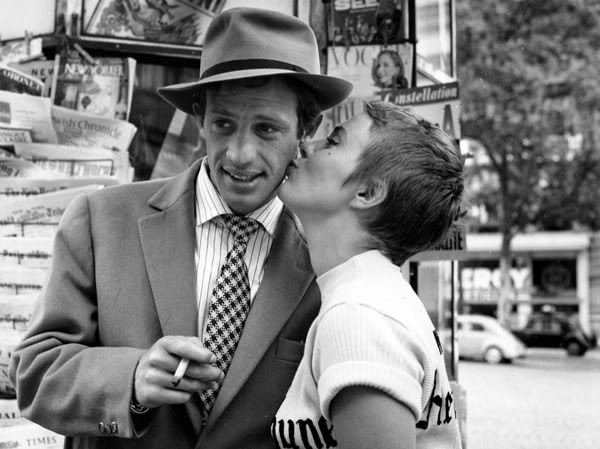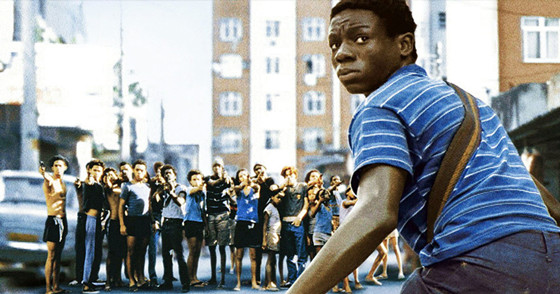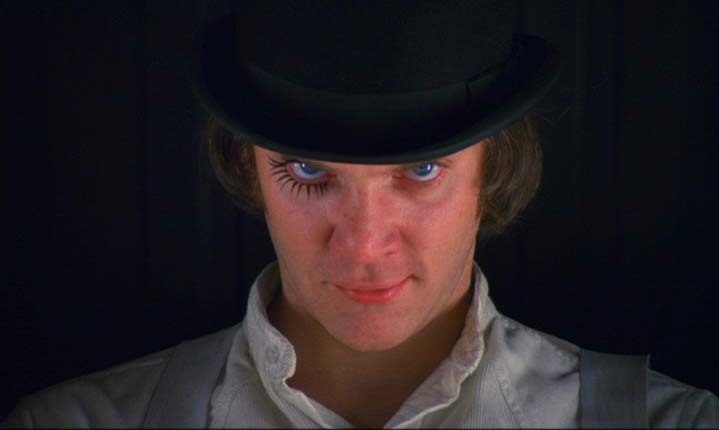5. Breathless

We have reached Godard, the pinnacle of insufferable cinema. Now don’t get me wrong; Jean-Luc Godard is one of the most essential and influential filmmakers of all time, he’s an institution of cinema by itself. Much of contemporary cinema is indebted to his pioneering films and experiments during the French New Wave and, indeed, he’s pretty much the foundation of modern editing (as one can see from this movie’s constant use of jump cuts).
“Breathless”, however influential and stylized a movie, is not terribly interesting. Following the illegal comings and goings of petty criminal Jean Paul Belmondo, in an irritatingly Brechtian performance, as he makes his ways through Parisian streets and Jean Seberg’s heart. Needless to say, there is a lot of casual sexism going on, and the film’s mocking aesthetics and satirical language prevent the characters’ actions from ever having any real weight.
However, it’s impossible to say all of that is not intentional. Godard, ever the incredible film connoisseur and intellectual, imbues the film with a careful observation of all its artifices. That is to say, “Breathless” constantly reveals itself as a film, it never assumes it is a portrait of reality (such is not Godard’s M.O). But even though it’s all intentional and purposeful, it’s not a terribly interesting ordeal. It’s actually quite boring for the most part, as its meta aspirations, albeit charming, never really amount to fascination or depth.
Godard would later move on to far more interesting and impactful works, such as “Vivre La Vie”, “Weekend”, “Le Mépris” (a far deeper observation of the cinema-reality impossibility) and “Je Vous Salue, Marie”, among others.
4. City of God

As a cinema-studying Brazilian growing up post “City of God”, it’s impossible to escape that film’s fame and influence. As the only movie in Brazil’s history to ever be nominated for a Best Director Academy Award, it’s probably the most well-known Brazilian film of all time. But is it really good? And, most importantly, is it a fair portrait of the Cidade de Deus favela?
First of all, the movie’s gleeful portrait of violence is worrisome, to say the least, especially as it presents all of its characters as complicit or even active participants in such violence. Now, of course, it could be levelled that growing up in such a brutal environment makes the favela inhabitants desensitized – as it does in real life, mind you – but there’s an abyss between showing characters’ apathy towards extreme violence and depicting extreme violence in a highly stylized fashion.
I might not be the most appropriate person to criticize this film’s portrayal of violence, given it is somewhat close to my reality so do forgive any emotional response I might spur out. But Fernando Meirelles and Katia Lund do have a responsibility towards their subject matter; presenting social brutality as an isolated incident without paying attention to all the societal implications and consequences of such violence is a serious misstep.
For all its brilliant elements – the vivid camera work, the superb editing, the amazing performances -, “City of God” ultimately plays like “Goodfellas” in the favela. But whereas the latter deals with bursts of violence inside a somewhat self-contained society (it rarely reaches innocent by-standers), “City” has the same approach towards violence that reaches all instances of Brazilian society and stem from many different and complex points (lack of social infrastructure and government interest/financing, to name but a few).
This approach proves to be quite misguided within the context of the movie, and Meirelles and Lund’s entertaining display of violence is almost as shocking as the violence itself.
3. Fight Club

The ultimate dude-bro film. The most quoted movie on facebook and pseudo-cinephile t-shirts. One of the most homoerotic-toxic-masculinity flicks ever made, and definitely among the 10 best known 90’s movies. “Fight Club” holds a lot of (dubious) titles and has a lot of qualities. It’s a well filmed and well-acted movie, it has an interesting screenplay and a surprising plot twist. But boy, does it get blown out of proportion.
One only wonders when and why did “Fight Club” achieve this immaculate reputation it thrives upon nowadays. Upon release, the movie was a critical and box office bomb, and only recently has it been revisited and touted as a cinematic classic. But it’s far from a truly remarkable film and much of what makes it overrated is this immense new wave of appraisal for it.
David Fincher is a great director, and in here he displays a firm grip of his filmmaking chops, managing to imbue pathos and dynamic to his camera work. But the movie never quite develops beyond a few interesting comments on masculinity and men’s need for violence; a lot of its more overt “message” regarding consumerism and megalomaniac revolution is spouted in ridiculous exposition-laden dialogues. Furthermore, Tyler Durden is nowhere near as much of a fascinating character as many claim him to be, the archetypes he represents are tiresome and repetitive throughout.
“Fight Club” is far from a bad film, but it is most definitely not a cinematic classic, it is not one of the greatest movies ever made. And it doesn’t even hold a candle to some of Fincher’s great works, such as “Zodiac”, “The Social Network” and “The Girl With The Dragon Tattoo”.
2. A Clockwork Orange

“A Clockwork Orange” is not a bad film! It’s a great film, an undeniable classic, one of the most influential and controversial movies ever made. It boasts a great performance and it’s an aesthetically unique work of art. But, much akin “Fight Club”, it’s been put on a pedestal of cinematic perfection that prevents cinephiles from observing the film’s shortcomings.
Sure, it hasn’t aged that well and much of the directing feels oddly stilted on a second viewing. But most of the film’s problems arrive after its opening third, where, after Alex (Malcom Mcdowell) is brought to prison, the story loses pace and rhythm and just slugs throughout the remainder of the movie.
To call it overlong is an understatement, and accompanying Alex through all of his ordeal without ever getting to know him (indeed, Kubrick’s ice cold approach feels like a disservice in this regard, given we only ever care about Alex due to Mcdowell’s towering charisma but even that begins to fade as the story unfolds) can be quite an arduous task.
It is still a wonderful analysis of society, one of the movies that can best sell overacting as realistic and powerful, and an uncompromising, hard to watch but essential film with several things to say.
1. Taxi Driver

Martin Scorsese’s “Taxi Driver” is a snooze-fest. There, I said it. It’s an overlong, flat out unappealing look at PTSD in the wake on the Vietnam War. Sure, De Niro is on top form here (although it’s not quite one of his best performances) and Paul Schrader’s screenplay – apart from a lot of the voice overs – gives Travis Bickle some pathos but it’s never quite enough.
Bickle’s development remains superficial, as the constant voice overs tell us pretty much everything he thinks and feels about a myriad of subjects. De Niro is thus given little room for introspection, and a lot of his more subdued performance loses plenty of its otherwise ambiguous (in the writer’s opinion, more potentially interesting) appeal, which makes him a hell of a lot less potent a character.
Not only that, but Scorsese’s directing also loses much subtlety when almost every intention is made explicit, and Travis descent into madness can feel like it came out of nowhere because of those artifices.
While “Taxi Driver” is by no means a bad movie, it’s just a boring and supremely overrated piece of 1970’s American cinema.